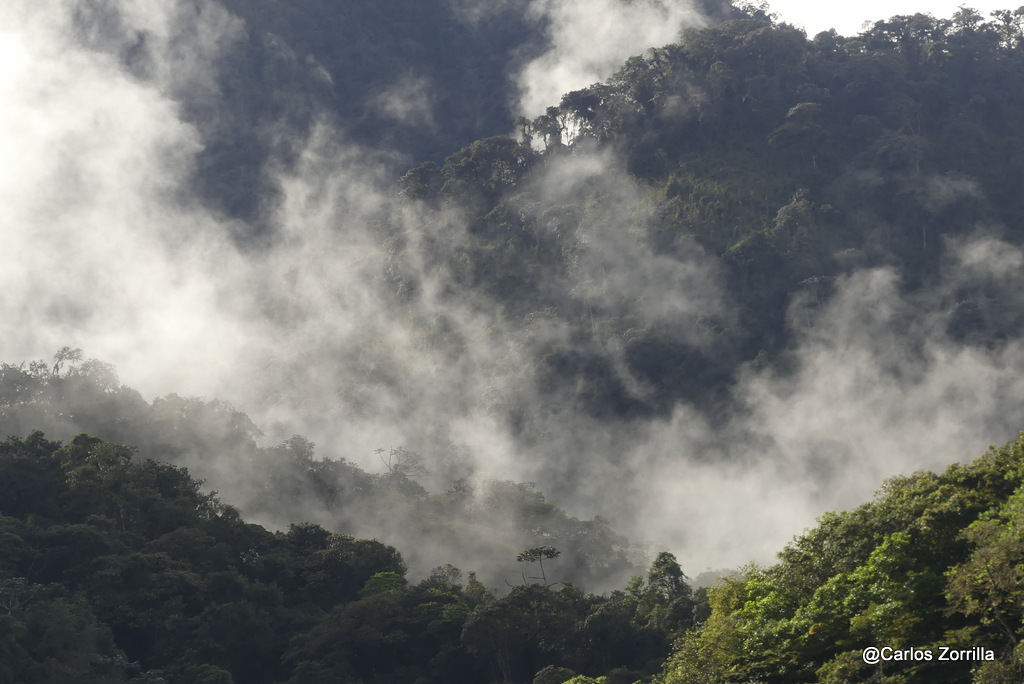Because of their cowardice we may never know

That was one of the questions I had in mind to ask the representative from the most powerful mining company in the world when they were invited to enlighten the room packed with locals from the small farming community of Cazarpamba about the company’s mining project. The mining concessions includes the community, as well of six others in Ecuador’s biodiverse Intag region. A region with 25 years of successfully resisting mining projects and expelling transnational mining companies.
But we also wanted to ask how they think they’ll get around not violating BHP’s own environmental policies in an area harboring so many species facing extinction. Another unanswered question was: could they show proof that the environmental permit to begin exploration was obtained in compliance with the community’s Constitutional right to be previously consulted?
A memorable presentation
We never got to ask the questions because when the employees from BHP discovered that I along with several other Intag residents from other communities within the same concessions were there to ask questions, all of a sudden, and without even beginning their presentation, they packed up their computer and Infocus and literally ran out the door. They left to a chorus of “why are you leaving?” and “what are you hiding?”
The sudden and cowardly departure came after the employee tried repeatedly to pressure the community’s and local government presidents to prohibit our participation. The excuse was that it was supposed to be a private meeting “just with the community”. We countered with the fact that since the over 9,000 hectares of concessions the company owns in our region encompasses our communities, primary forests and farmlands, we had a damn good reason to be there. Anyway, a close-door meeting of a socialization of a mining project is as contradictory in terms as it gets. You can fill in the blanks about the consequences of them choosing not to be transparent. It certainly made them look ridiculous.
In what was a embarrassing defeat for the company, the community members were able to see right through the company’s fears of presenting information about mining in front of people who actually know about it and they voted to allow us to stay and present our points of view after the company’s presentation.
What are they hiding? Is it that maybe that the information they supplied the Ministry of the Environment to get their exploration permit about the social and environmental realities on the ground is bogus? Or could it be that the permit they received from the water secretariat was based on woefully inadequate or non-existing on-the-ground inspections? Or did they realize that their story about exploration not causing environmental impacts, as one of the employees claimed, would be completely laughed off?
We may never know. For reasons that should be obvious, mining companies fear presenting information in front of people who know about mining. And, this not the first time. Only two weeks earlier, the Apuela Parish government formally invited the company to inform representatives from all the communities within the local government jurisdiction about the mining project. The company not only accepted the invitation but confirmed its presence. This time company officials didn’t run away. They didn’t have to, because they didn’t even show up.

There are a several reasons why companies are afraid of socializing their projects in front of individuals who know the real story behind the fairy tales they present. The principal one being that, once they are given contrasting and verifiable information about the true impacts of mining, the locals will wise up and throw them out. Instead of informing the public about the possible negative effects of mining, the socialization amount to little more than offering jobs and creating false expectations. Also, according to Securities law, companies must reveal material information to the Stock Exchanges where they list and their shareholders. If an inconvenient fact comes up at these pseudo socializations, they’d pretty much are obliged to report it. Such as the fact that after two years of getting their concessions they’ve been unable to start exploration, the inevitability of impacting habitats of endemic and or critically endangered species, or obtaining permits without proper Constitutional consultation.
Whatever the real reason for their cowardly flight, they’ll have some explaining to do in the following presentations. And we’ll be there to make sure folks know the real story.
Carlos Zorrilla
DECOIN / Defensa y Conservación Ecológica de Intagwww.decoin.org
